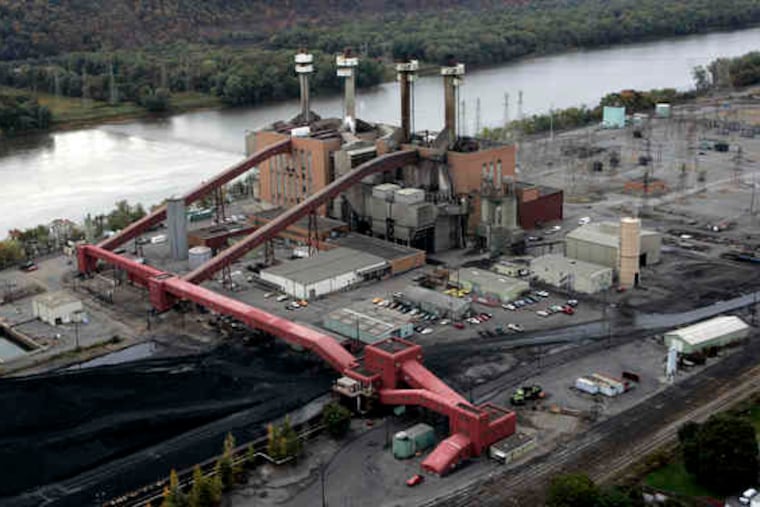PhillyDeals: Pa. utilities lining up behind clean-energy act
Is an economic slump the right time to force U.S. companies to burn less fuel? The American Clean Energy and Security Act (HR 2454) would force U.S. industrial and power plants to cut the carbon spewing from our slice of the world (by one-sixth in 2020, five-sixths in 2050), and to mandate and subsidize "clean" (but costly) power from water, wind, and sun.

Is an economic slump the right time to force U.S. companies to burn less fuel?
The American Clean Energy and Security Act (HR 2454) would force U.S. industrial and power plants to cut the carbon spewing from our slice of the world (by one-sixth in 2020, five-sixths in 2050), and to mandate and subsidize "clean" (but costly) power from water, wind, and sun.
U.S. Rep. Jim Gerlach (R., Pa.) brought Pennsylvania utility lobbyists, manufacturers, and an environmentalist or two to the Chester County Economic Development Council in Exton yesterday to review how much it is likely to cost to privatize air pollution, and to ask who will end up paying for it, and how much.
This kind of mandate has died in Congress before. But Gerlach warned it's different now: The Supreme Court has ruled that common carbon dioxide is "pollution" and the Environmental Protection Agency can regulate it.
So "if Congress does not act and sort of punts on this issue, the EPA may move forward" with stricter rules, Gerlach warned.
Big power companies are on board. "We support this legislation," said Exelon Corp.'s Thom Chiomento. "It is our number-one priority to see this enacted."
The power companies figure they are responsible for "40 percent" of U.S. carbon emissions, said Exelon's Scott Brown. "What we see in this legislation is on balance a reasonable business approach to reducing carbon dioxide," Brown said. He termed it similar to the "cap-and-trade" limits and pollution-trading arrangements utilities already live with for sulphur and nitrogen oxides.
Scott estimates the cost of reducing carbon emissions at "a little under a half-cent a kilowatt-hour."
"For a 1,000-kilowatt-hour per month household, which is a typical household, that's around $75 a year" for electricity, and maybe another $100 from higher prices for U.S. goods that will cost more to make, he said.
But utilities can pass costs to customers. Manufacturers, like other consumers, have to eat them.
Alan Brink, of 120-employee Spring City Electrical Manufacturing, figures the price Scott cited would boost his firm's electrical costs by roughly $750 per employee. He said it would be a lot cheaper, on that basis, to switch back to coal - except that Spring City had to stop using coal to comply with the government's earlier pollution limits.
Troy Greiss, of Berks County battery-maker East Penn Manufacturing, says his company has been adding jobs, and also expanding its solar- and wind-power sources. But he says it will be hard to keep growing if the government demands it do still more to cut carbon.
"This is going to have a profound impact on the Pa. economy," said Rob Powelson, a Pennsylvania Public Utilities commissioner. "This is a bad piece of legislation for Pennsylvania."
At that point Exelon's Brown stepped in. "You've got to tell the other side of the story," he said. "Do we as a nation want to reduce carbon? Do we want command and control from EPA? Take the balanced step: Address the issue, and try to reduce our carbon footprint."
The bill could come to a House vote this week, Gerlach aide Lauryn Schothorst told the group.
Decoys help save 550
Alloy Surfaces Co. Inc. says it has won $83 million in U.S. contracts to build more than one million eight-inch infrared "special material decoys" to protect military jet fighters and helicopters.
That means no layoffs at Alloy's three Aston plants, which employ 550. "This keeps us going real well for the next two years," Alloy president John LaFemina told me. Alloy is owned by U.K.-based Chemring Group PLC.
Budget balancer?
Pennsylvania state House Speaker Keith McCall (D., Carbon) wants to flatten the state's business tax rate, nominally 9.99 percent, down to the state personal income tax rate of 3.07 percent. He says it would end "loopholes" by imposing "combined reporting," which makes it tougher to move Pennsylvania income out of state. Aide Bob Caton said business groups support the plan. He's working on revenue estimates . . . and working on Gov. Rendell.